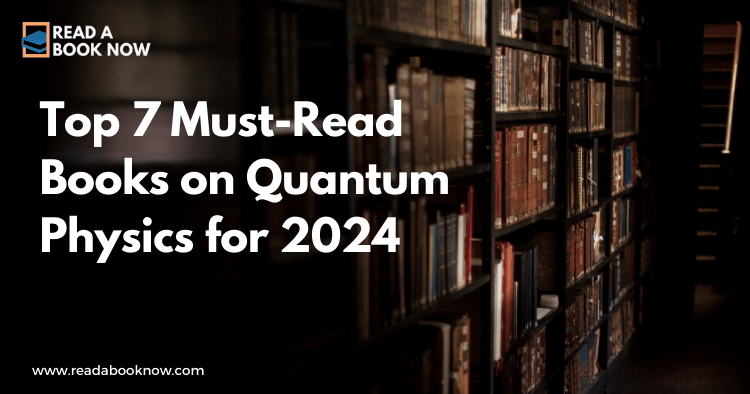Table of Contents
- Introduction
- 1. “Quantum Physics for Beginners” by Carl J. Pratt
- 2. “The Quantum World: Quantum Physics for Everyone” by Kenneth W. Ford
- 3. “Quantum Mechanics: The Theoretical Minimum” by Leonard Susskind
- 4. “Quantum Physics: A Beginner’s Guide” by Gary L. Johnson
- 5. “The Elegant Universe” by Brian Greene
- 6. “Quantum Enigma: Physics Encounters Consciousness” by Bruce Rosenblum and Fred Kuttner
- 7. “Quantum Physics for Dummies” by Steven Holzner
- Conclusion
- FAQs
Introduction
Quantum physics is a captivating field that continues to intrigue both scientists and the general public. As we enter 2024, interest in quantum mechanics remains strong, driven by developments in technology and ongoing research. This article highlights seven essential books that offer insights into quantum physics, making complex theories accessible to a wide audience. Whether you’re a novice or a seasoned reader, these titles will enhance your understanding of this fascinating subject.
1. Quantum Physics for Beginners by Carl J. Pratt
Carl J. Pratt’s “Quantum Physics for Beginners” serves as a perfect introduction to the field. This book simplifies complex concepts like wave-particle duality and quantum entanglement, making them accessible to non-specialists. Pratt uses engaging analogies and clear explanations, ensuring that readers can grasp the fundamental principles without a physics background.
Key Features:
- Illustrated examples to clarify concepts.
- Easy-to-follow structure, ideal for new learners.
- Includes a glossary of key terms.
Why Read It?
This book is not just for beginners; it’s a delightful read for anyone wanting to revisit the basics of quantum physics with a fresh perspective.
2. The Quantum World: Quantum Physics for Everyone by Kenneth W. Ford
Kenneth W. Ford’s “The Quantum World” takes readers on a journey through the strange phenomena of quantum mechanics. The author expertly connects historical context with modern applications, making it easier to comprehend the evolution of quantum theory.
Key Features:
- Clear explanations of complex topics.
- Historical anecdotes and profiles of key figures in quantum physics.
- Practical applications of quantum physics in technology.
Why Read It?
This book is perfect for those interested in understanding not just the ‘how’ but also the ‘why’ behind quantum concepts.
3. Quantum Mechanics: The Theoretical Minimum by Leonard Susskind
Renowned physicist Leonard Susskind presents “Quantum Mechanics: The Theoretical Minimum,” which dives into the mathematical foundations of quantum mechanics. This is ideal for readers with a basic understanding of physics who wish to delve deeper into the subject.
Key Features:
- Rigorous mathematical approach without excessive jargon.
- Exercises and problems to reinforce learning.
- A companion volume to Susskind’s other works.
Why Read It?
If you’re serious about grasping the theoretical underpinnings of quantum physics, this book is a must-have.
4. Quantum Physics: A Beginner’s Guide by Gary L. Johnson
In “Quantum Physics: A Beginner’s Guide,” Gary L. Johnson provides a straightforward introduction to quantum concepts, emphasizing clarity and engagement. He discusses the implications of quantum theory on our understanding of reality.
Key Features:
- Engaging writing style that makes complex ideas relatable.
- Real-world examples that illustrate quantum phenomena.
- Discussion of the philosophical implications of quantum physics.
Why Read It?
This book is an excellent choice for those who enjoy philosophical inquiries alongside scientific explanations.
5. The Elegant Universe by Brian Greene
Brian Greene’s “The Elegant Universe” explores string theory and its implications for understanding the universe. Greene’s ability to weave together complex theories with storytelling makes this book a captivating read.
Key Features:
- Insightful explanations of string theory and its relevance.
- Beautiful illustrations that enhance understanding.
- Engaging narrative style that keeps readers hooked.
Why Read It?
For those intrigued by the intersection of quantum physics and cosmology, Greene’s work is an essential read.
6. Quantum Enigma: Physics Encounters Consciousness by Bruce Rosenblum and Fred Kuttner
“Quantum Enigma” delves into the philosophical questions that arise from quantum mechanics, particularly concerning consciousness. Authors Bruce Rosenblum and Fred Kuttner challenge readers to ponder the implications of quantum theory on our understanding of reality.
Key Features:
- Exploration of the relationship between quantum physics and consciousness.
- Thought-provoking questions and discussions.
- Accessible writing style for a broad audience.
Why Read It?
This book is perfect for readers looking to explore the deeper implications of quantum physics beyond the mathematics.
7. Quantum Physics for Dummies by Steven Holzner
Steven Holzner’s “Quantum Physics for Dummies” offers a light-hearted yet comprehensive introduction to quantum physics. It’s a fantastic resource for those who feel intimidated by the subject or who want a straightforward overview.
Key Features:
- Easy-to-understand explanations of complex topics.
- Practical examples that resonate with everyday experiences.
- Tips for further reading and study.
Why Read It?
This book is an ideal choice for anyone who wants to dip their toes into the fascinating world of quantum physics without feeling overwhelmed.
Conclusion
These seven books represent a diverse range of perspectives on quantum physics, catering to beginners and seasoned readers alike. Whether you’re interested in practical applications, rigorous theory, or philosophical implications, there’s something on this list for everyone. As you embark on your quantum journey in 2024, these titles will provide you with both knowledge and inspiration.
FAQs
What is quantum physics?
Quantum physics is the branch of physics that studies the behavior of matter and energy at the smallest scales, such as atoms and subatomic particles.
Why is quantum physics important?
Quantum physics has led to revolutionary technologies like lasers, semiconductors, and quantum computing, fundamentally changing our understanding of the universe.
Can I understand quantum physics without a science background?
Absolutely! Many of the books listed above are designed for beginners and explain complex concepts in a clear and engaging manner.
Where can I find more resources on quantum physics?
For more information, you can visit PBS Space Time, which offers various articles and videos on quantum physics and related topics.
What should I read next after these books?
Once you’ve grasped the basics, consider exploring advanced texts or diving into specific topics like quantum computing or quantum field theory.
Feel free to explore these titles and expand your understanding of quantum physics in 2024! Happy reading!




